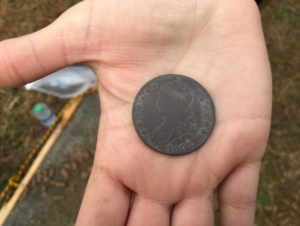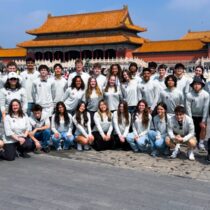
Tuesday is Harriet Tubman Day as proclaimed by the U.S. Congress in 1990. She was born into slavery in Bucktown, Maryland and escaped in 1849.
She then led 19 trips as a conductor on the Underground Railroad and spoke out against slavery. She served in the Civil War as a soldier, spy, nurse, scout and cook.
On April of 2021, when this article was first published, the historic homesite of her father was located, according to a press release from Maryland Lieutenant Governor Boyd K. Rutherford and federal partners at the Harriet Tubman Underground Railroad Visitor Center.
The home of Ben Ross, Tubman’s father, was discovered on U.S. Fish and Wildlife Service land that was acquired in 2020 so it could be added to the Blackwater National Wildlife Refuge in Dorchester County. An archeology team led by the state Department of Transportation State Highway Administration conducted research that resulted in finding the Ross home.
“This discovery adds another puzzle piece to the story of Harriet Tubman, the state of Maryland, and our nation,” Rutherford said in a press release. “It is important that we continue to uncover parts of our history that we can learn from, especially when they can be lost to time, and other forces. I hope that this latest success story can inspire similar efforts and help strengthen our partnerships in the future.”
The team, led by MDOT SHA Chief Archaeologist Dr. Julie Schablitsky, began searching for evidence linked to Ross in November. In March, Schablitsky and her team found numerous artifacts dating to the 1800s, including nails, brick, glass, dish fragments and even a button. At this morning’s announcement, Schablitsky confirmed that those artifacts were part of the discovery of the Ross cabin.
“The importance of discovering Ben Ross’ cabin here is the connection to Harriet Tubman. She would’ve spent time here as a child, but also she would’ve come back and been living here with her father in her teenage years, working alongside him,” said Schablitsky. “This was the opportunity she had to learn about how to navigate and survive in the wetlands and the woods. We believe this experience was able to benefit her when she began to move people to freedom.”
As the most famous conductor of the Underground Railroad, Maryland native Harriet Tubman heroically led so many men, women, and children to freedom. On this Harriet Tubman Day, we honor her incredible life and ensure that her legacy continues to live on. pic.twitter.com/F6cpz5Jcqm
— Governor Larry Hogan (@GovLarryHogan) March 10, 2022
Douglas Mitchell, great-great-great-grandson of Ross, said in the news release, “The significance of the discovery of the homesite of my great-great-great-grandfather Ben Ross, and of a spellbinding assortment of artifacts that were once held in the hands of the man himself, but have since been long-inhumed in the soggy Dorchester County soil, is truly inestimable.”
He added, “Dr. Schablitsky’s findings hold the promise of both deepening and broadening our understanding of the remarkable life not only of the patriarch and his beloved wife, but also, of course, that of his legendary daughter and heroine, Harriet Tubman. On this joyous occasion, more than 160 years after Ben Ross departed his humble cabin never to return, all freedom-and-justice-loving Americans are Ross kin, celebrating this immensely important archaeological discovery and the priceless revelations it is destined to offer.”
USFWS purchased the 2,600-acre Peter’s Neck property for $6 million with Land and Water Conservation Funds and revenues from the Federal Duck Stamps program, along with assistance from The Conservation Fund. The property contains 10 acres bequeathed to Ben Ross by Anthony Thompson in the 1800s. As outlined in Thompson’s will, Ben Ross was to be freed five years after Thompson’s death in 1836. Ross was freed from slavery and received the land in the early 1840s.
The family home of Harriet Tubman has been located #flickr https://t.co/GvG8bpN1z9
— suzanne pollak (@SuzannePollak) April 20, 2021
“When we protect vulnerable habitats, we help preserve the stories of those who came before us, like Harriet Tubman’s father, Ben Ross,” said USFWS Chief of the National Wildlife Refuge System Cynthia Martinez in the news release. “Acquiring Peter’s Neck last year was a critical addition to Blackwater National Wildlife Refuge, as the area is predicted to naturally convert to marsh by 2100 because of sea-level rise. We look forward to working with our partners to create more opportunities to connect people to nature and strengthen the bond between the land and community.”
“Discovering the location of patriarch Ben Ross Sr.’s home and artifacts he used has humanized a man responsible for giving us a woman of epic proportions, Harriet Ross Tubman,” said Tina Wyatt, Harriet Tubman’s great-great-great-grandniece and Ben Ross’ great-great-great-great-granddaughter. “This brings enlightenment, revealing how he lived his daily life making it a real-life connection to and for me, a great-great-great-great-granddaughter. The world benefits also from the study of these artifacts concerning objects used by the enslaved; are they common to this plantation, to his position, or to this region? It gives us so much more to explore, explain and exhibit.”
Harriet Tubman was born Araminta Ross in March 1822 on the Thompson Farm near Cambridge in Dorchester County. She and her mother were enslaved by the Brodess family and moved away from the farm when she was a toddler. Ben Ross felled and sold timber, which was transported by free black mariners to Baltimore shipyards and used to build ships. Harriet Tubman learned to navigate difficult terrain while working with her father. Interacting with mariners also provided knowledge of waterways on the East Coast, which may have helped her lead people to freedom via the Underground Railroad.
An archaeology team led by @MDSHA has discovered the Dorchester County homesite of Ben Ross, father of abolitionist Harriet Tubman. Learn more about the discovery at: https://t.co/hyJqjqZQ5F and on our blog, Transportation Talk: https://t.co/2iq96S0SfB. #MDOTexperts pic.twitter.com/e2hhMxeHBm
— MDTransportationDept (@MDOTNews) April 20, 2021


Comments are closed.